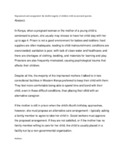Stigmatised and unsupported: the double tragedy of children with incarcerated parents.
Abstract
In Kenya, when a pregnant woman or the mother of a young child is sentenced to prison, she usually may choose to have her child stay with her up to age 4. Prison is not a good environment for babies and toddlers: food supplies are often inadequate, leading to child malnourishment; conditions are overcrowded; sanitation is poor, with lack of clean water and healthcare; and there are shortages of clothing, bedding, and materials for learning and play. Prisoners are also frequently mistreated, causing psychological trauma that affects their children.
Despite all this, the majority of the imprisoned mothers I talked to in two correctional facilities in Western Kenya preferred to keep their child with them. They feel more comfortable being able to spend time and bond with their child, even in these difficult conditions, than placing their child with an alternative caregiver.
If the mother is still in prison when the child’s fourth birthday approaches, however, she must propose an alternative care arrangement – typically asking a family member to agree to take her child in. Social workers must approve the proposed arrangement. If they are not satisfied, or if the mother has no family member willing to care for her child, the child is usually placed in a facility run by a non-governmental organisation.
URI
https://earlychildhoodmatters.online/2020/stigmatised-and-unsupported-the-double-tragedy-of-children-with-incarcerated-parents/http://ir-library.mmust.ac.ke:8080/xmlui/handle/123456789/1849
Collections
- Journal Articles [411]

